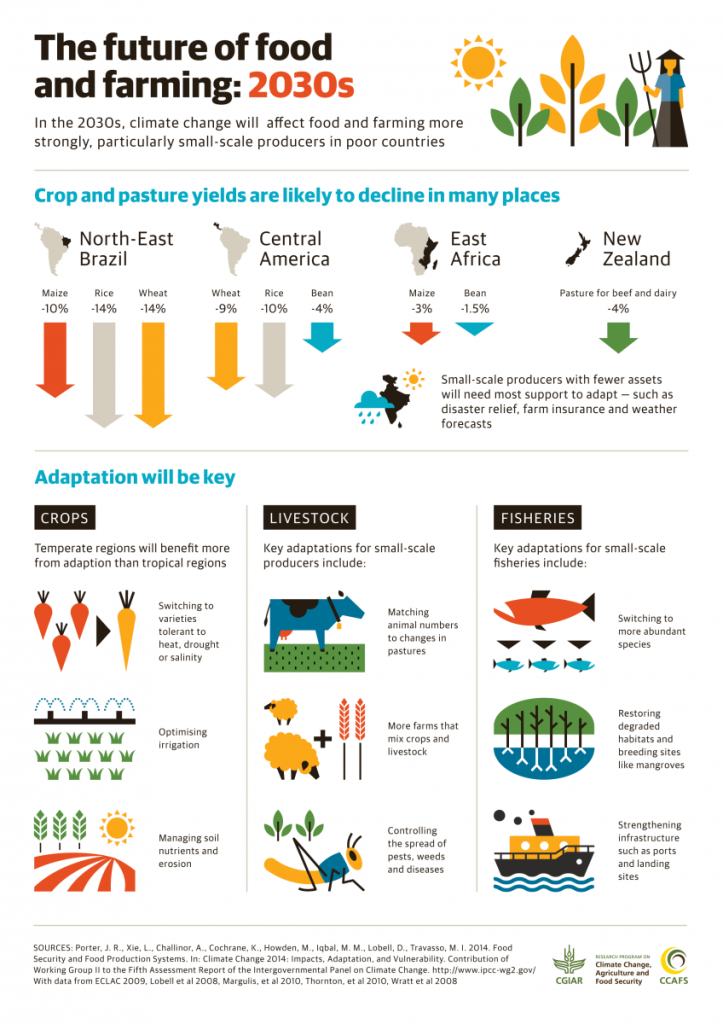|
|
|
November 30, 2015: Africa's Climate Change Adaptation
|
|
|
|
|
|
|
|
"Food production will have to rise 60% by 2050 just to keep pace with expected global population increase and changing demand. Climate change comes on top of that. The annual production gains we have come to expect … will be taken away by climate change. We are not so worried about the total amount of food produced so much as the vulnerability of the one billion people who are without food already and who will be hit hardest by climate change. They have no capacity to adapt." Frank Rijsberman, Head of CGIAR crop research centers.
|
 |
|
|
|
In 2015, Africa has close to 320 coastal cities (with more than 10,000 people), and an estimated population of 100 million people living in low elevation (<10-m) coastal zones; by 2020, it is projected that between 75 and 250 million people in Africa will be exposed to increased water stress due to climate change. Various sources have reported projections estimate that climate change will lead to an equivalent of slightly less than 5% to 10% annual loss in GDP in Africa by 2040 (including market and non-market sectors, without adaptation). Climate models mostly predict an increase in annual maximum temperatures in the region of 1 to 2C by 2050, with IFPRI suggesting that crop yields across sub-Saharan Africa may decline 5-22% by 2050 and towards the end of the 21st century, the sea level rise will affect low-lying coastal areas with large populations.
|
|
|
|
|
|
|
|
“Africa receives 325 days per year of sunlight and is using less than 7% of its hydroelectric potential, and less than 2% of its geothermal capacity” said UNEP executive director Achim Steiner.”
It is estimated that the African continent will require $50-billion in the agricultural sector, $800-billion in the energy sector and $700-million in water-related technologies, including sanitation, water infrastructure and chemicals.
With less than 3% of the world’s total emissions of green house gases, the African continent makes no significant contribution to global warming.
In Africa, where agriculture accounts for 32% of its GDP and supports the livelihoods of 80% of its population, investments in green practices such as organic agriculture could provide a cash boom.
- Egypt expects to lose 15% of its wheat crops if temperatures raise 2C, and 36% if the increase is 4C.
- Morocco expects crops to remain stable up to about 2030, but a drop is projected.
- In Burkina Faso, the sorghum crop is expected to decline by 25% or more, but maize yields is likely to improve.
- A study of 11 West African countries expects most to be able to grow more food as temperatures rise and rainfall increases.
- Climate change may mean Nigeria, Ghana and Togo can grow and export more sorghum.
|
|
|
|
|
|
|
|
To get it started, we have a dynamic fellow Anders who has joined us to assit with Agrifrica scope of work. He is currently working on content management and outreach and we are happy to introduce you to him.
| ANDERS BUSCH |
 |
I am a highly motivated 23-year-old Danish student doing a bachelor at Copenhagen Business School. I study Intercultural Market Communications or, in other words, marketing and communications in an intercultural perspective. Therefore, I find a position as brand fellow in Afrolehar a perfect place to exploit my interest in marketing while gaining hands-on experience. I hope my work will help Afrolehar with its objective of enhancing trade relations between America and Africa via cross-cultural branding. Hopefully, working for Afrolehar will be a step on a long career ending as brand manager in a larger corporation.
In my spare time, I love spending time with my family and friends, go to the gym, travelling, and playing soccer.
Currently I am living in Copenhagen, which is also where I work from as the internship is virtual.
|
|
|
| Like us on Facebook and follow us on Twitter. Send us an email with your thoughts on this month’s newsletter and to learn more about the work that we are doing to info@afrolehar.com |
  |
|
| © 2015 Afrolehar |
| Unsubscrbe from Newsletter |
|